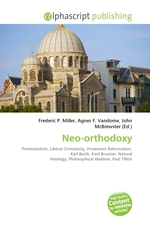Neo-orthodoxy
Frederic P. Miller, Agnes F. Vandome, John McBrewster
бумажная книга
High Quality Content by WIKIPEDIA articles! Neo-orthodoxy, in Europe also known as theology of crisis and dialectical theology, is an approach to theology in Protestantism that was developed in the aftermath of the First World War (1914–1918). It is characterized as a reaction against doctrines of 19th century liberal theology and a more positive reevaluation of the teachings of the Reformation, much of which had been in decline (especially in western Europe) since the late 18th century. It is primarily associated with two Swiss professors and pastors, Karl Barth (1886–1968) and Emil Brunner (1899–1966), even though Barth himself expressed his unease in the use of the term. German scholars since the 1990s have warned English-speaking (i.e., "the Anglo-American world") scholarship against too serious an application of neo-orthodoxy as a theological paradigm, calling such use a "neo-orthodox reading" or "neo-orthodox misreading" of a theologian's work, especially that of Karl Barth.
Данное издание не является оригинальным. Книга печатается по технологии принт-он-деманд после получения заказа.


